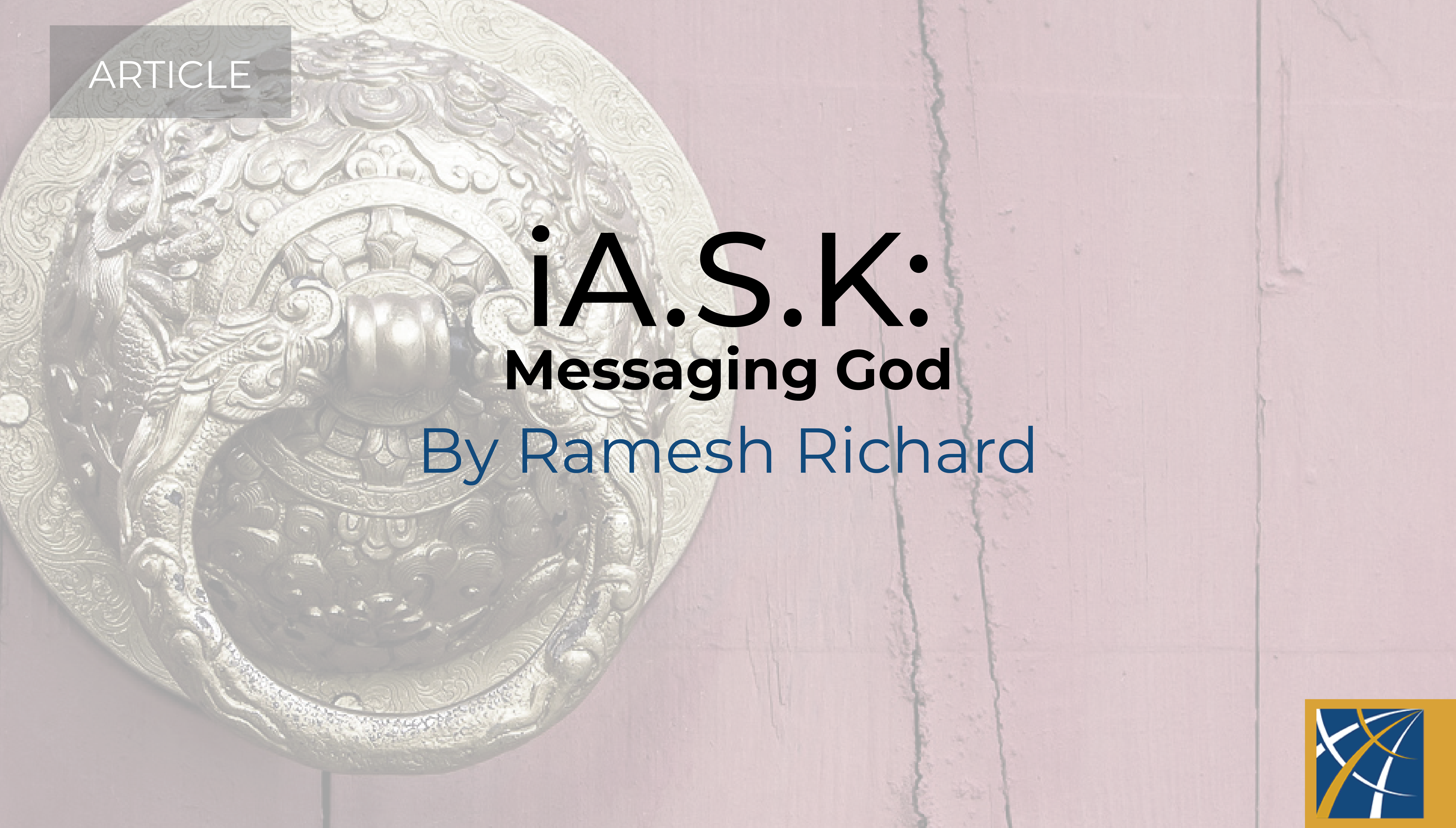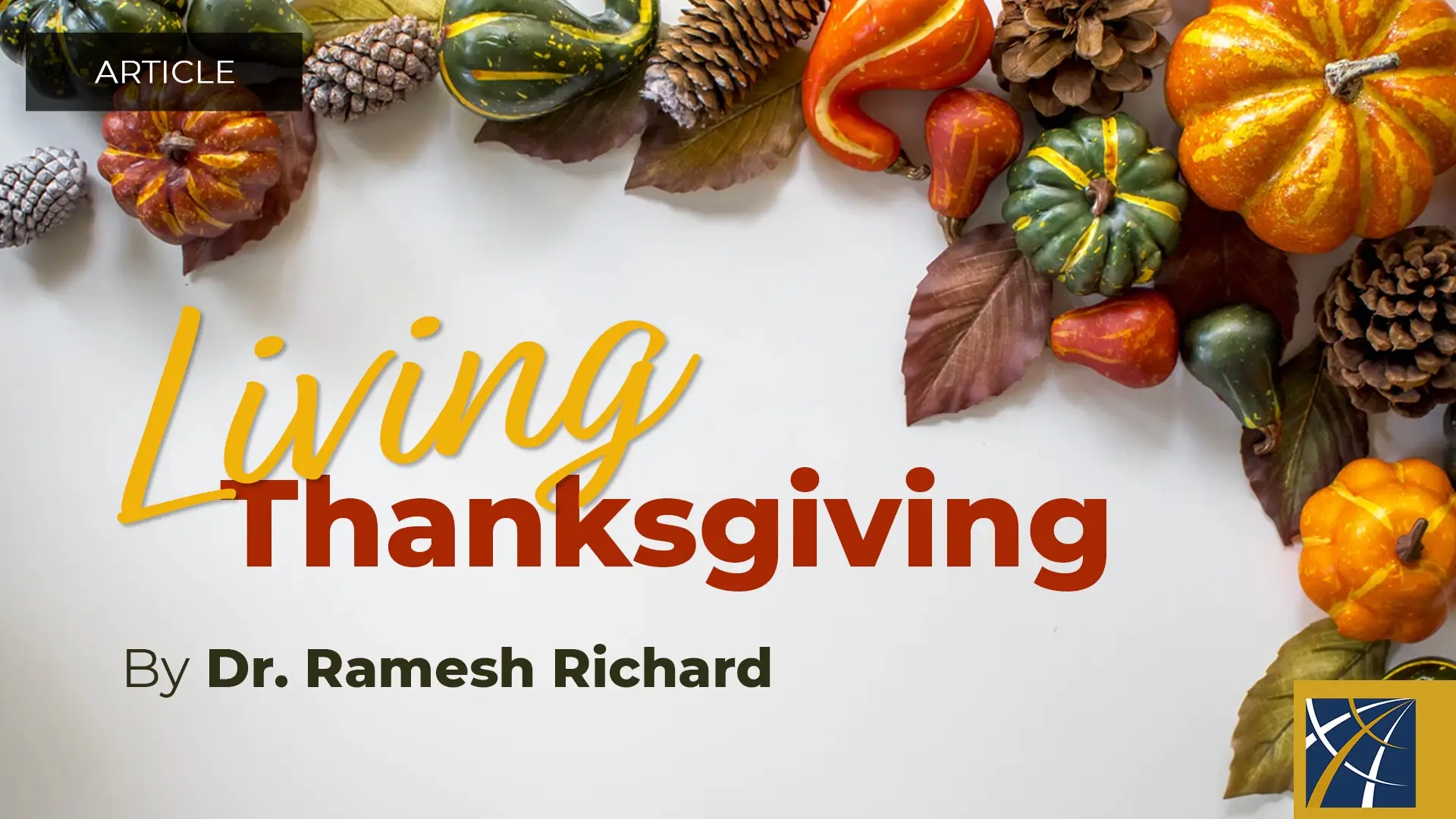by Ramesh Richard
The ubiquitous “i” prefix stands for words like internet and innovation. It has also turned us inward, arousing self-centeredness and exhibitionism through selfies and social media. But altruistic verbs like care or love can sanctify the “i” pronoun in front of them. I recently addressed a thousand missionaries characterized by iGive or iDie in the two largest lands in the world.
For this devotional on the theology and practice of biblical prayer, the verb that follows the “i” is an acronym. As such, it will be pronounceable and memorable, and more importantly, doable.
The acronym A.S.K. generates from Matthew 7:7–8, where our Lord commands us with three back-to back imperatives:
Ask, and it shall be given to you; seek, and you shall find; knock, and it shall be opened to you. For everyone who asks receives, and he who seeks finds, and to him who knocks it shall be opened. (NASB, emphasis added)
These commands theologically express “a strain toward consistency.” They build on one another and are integrated in practice. Asking is seeking and knocking. Seeking is asking and knocking. Knocking is asking and seeking.
But since the content and manner of our A.S.K.ing are not found in these verses, we must search them out in other parts of Scripture.
A.
Ask means ask. As in a request. If God asks me to ask, it must mean there are some important things lacking in my life, things I can’t provide for myself. Here’s a starter list:
- Good gifts. We can ask our Father for good gifts of any kind. Jesus promises good gifts to those who ask of the heavenly Father. Much like a loving human father does not deceive or disappoint, our heavenly Father provides a good-gift-giver guarantee (Mt. 7:9–11).
- The Holy Spirit. The best good gift, according to Luke’s parallel passage, is the Holy Spirit Himself (11:13). We live during this economy of the Holy Spirit, who empowers us with godliness for every situation, and also voices our prayers before the Father (Rom 8:26–27). Unless I consider Him the best good gift I can receive from God, I neither understand the heart of God or the meaning of good. For since I have God, I have everything I really need. If I don’t have God, nothing else really matters for very long.
- Wisdom. God’s generous and gracious gift of wisdom is another one of the good gifts that we can solicit without hesitation. “If any of you lacks wisdom, let him ask of God, who gives…” (Jas 1:5).
Everyone who asks receives, says the Lord Jesus. So iA.S.K for the Father’s good gifts, especially the filling of the Holy Spirit and His wisdom to do life.
S.
Seeking is not as clear in its meaning as asking, but builds on it. Why seek? It certainly means that something is lost or missing in my life that needs to be found! And I can’t find it on my own.
While asking is verbal, seeking involves the heart and mind in our asking. We don’t just repeat words in ritualistic form for public recognition (Mt 6:5). We ask with earnest, enduring, expectant prayer from the heart.
Why? Because whatever I seek is my priority. My practice adjusts to the priority object sought. The hearts and minds of unbelievers, unlike soaring birds and field lilies, are filled with sinful anxiety in their search for the basics of life (Mt. 6:31–34).
As an alternative object, if our hearts and minds seek first God’s kingdom and His righteousness, all the things that nonbelievers seek (6:32-33) will be added to us. We won’t be missing out on His provision for our needs. But by not seeking His Kingdom, we will be sadly running around in vain, worrying about everything.
This, too, I am learning. Seeking God’s kingdom and His righteousness is to accept His spiritual reign in my personal life, to acknowledge His current reign over all reality, and to anticipate His future reign on earth. He who seeks God will find Him available and accessible (cf. Dt 4:29; Jer 29:13). So iA.S.K, seeking that His will be done on earth, personally, relationally and globally, even as it is in heaven.
K.
Knock has the most opaque meaning of the three commands. It seems that things are not only lacking for which we must ask, and things lost for which we must seek, but also things locked or blocked for which we must knock. At which door do we knock with our hands and enter with our feet?
It could well be the door to eternal salvation. Jesus’ audience of Pharisees attempted to gain God’s Kingdom by obligating God in religious ways. Jesus may be telling them to simply ask, seek and knock, and they will receive His way to enter through the door of His salvation.
What about the door of closed relationships? In this context, we are encouraged to reach former friends for reconciliation before offering our gifts to God (Mt 5:24). This knocking at the door of people’s hearts hoping for a welcome takes deep prayer.
The Bible also uses the “door” imagery for ministry opportunities (2 Cor 2:12). For this opportunity door, iA.S.K. especially. Even during this writing, I am asking, seeking and knocking for God’s knowledge, wisdom and assistance. I know I should not create opportunities, nor can I create resources. I can only knock at heaven’s door and on human doors. I do not push a ministry door open. At the end of the day, I need to be sure that it was God, not I, who opened a door. I must be able to walk through the door knowing without a doubt that I am obediently following God’s will.
Don’t worry if you have missed opportunity’s knock. Instead, knock at the door of heaven for opportunity, and it will be opened for you.
iA.S.K. Qualifications
Now, I know I should ask, but how do iA.S.K.? The Bible gives us the manner of our prayerful approach too, with directions and qualifications.
- iA.S.K. believing in Christ’s authority: Do I believe or doubt Jesus’ sovereign control of all reality? Do I possess a deep conviction about the Father’s goodness—that He gives good gifts, beginning with His Holy Spirit for power and wisdom? Am I convinced that what I am A.S.K.ing for is what God wants for Himself and for me? If I have nagging doubts about a matter, I shall stop asking, for a double-minded man will not receive anything (Jas 1:6). This is not a half-hearted ask either. Faith has full confidence that God’s answers can be received, found and opened, even in the middle of setbacks and downturns. Finally, believing in Christ’s authority is to ask in Jesus’ name. There is only one claim in the history of religion that invites us to ask God for “whatever…in My name…so that the Father may be glorified in the Son” (Jn 14:13). Hence, I shall be confident about what God is for and shall never ask for what God is against, and He promises that He will do it (cf. Jas 4:3). If you have asked for nothing in His name yet, He invites you to do so right away while believing in His authority, His ability and His goodness.
- iA.S.K. living in Christ’s Word: “If you abide in Me, and My words abide in you, ask whatever you wish, and it will be done for you,” says the Lord Jesus (Jn 15:7). This “abiding” begins a salvation connection between Jesus and me and can continue in active, intimate, vital relationship. Living in God’s Word is to have His Word live in us in constant exposure and immersion. We are separated to, connected with, and energized by Him. We keep away from temptation, resist Satan by His power, flee from known sins in all its forms, and are alert to temptations and sins yet unknown. So iA.S.K. God while abiding in Christ.
Since my wishes of God will only be His wishes for me, I remain in His love without sinful anxiety about His answers. I am open to whatever He may want to do in my life, whatever He wills, whenever He wishes, especially for much fruit that remains (Jn 15:16). - iA.S.K. serving in Christ’s program: iA.S.K.in reference to His purposes—what does He want for His family and mine? How does He want His global plans to be extended? iA.S.K. in reference to my usefulness, fruitfulness and effectiveness for Him. iA.S.K. for new ideas, opportunities and resources to fulfill my role in His Kingdom. iA.S.K. for the humanly impossible, and let God do only what He can do, while I do what I must do. Like the importunate widow bothering an ornery, unjust judge late into the night who finally responded to her in relief and justice (Lk 18:1–8), I too shall bother God in prayer to fulfill a part of His current plans in preview and preparation toward His future program.
Is all this doable? Here’s a simple but powerful tactic. Draw a vertical line to create two columns on a page. Place iA.S.K. on top of the left column, and He Answers on the right. Then write down what you believe you can keep on A.S.K.ing your Heavenly Father. And when He answers, write it down with the date. You will be filled with thanks, and with a growing faith to ask, seek, knock even more.
In this innovative Internet era, all messaging needs a WiFi network. Once turned on, my Wifi looks for networks to join. I click on the right one, enter the password, and voilá I am in! I construct, process and send messages to family and friends.
Prayer is simply messaging God. By trusting in the Lord Jesus—the only password—as my Savior I connect with God’s secure network. Now iA.S.K. regularly for whatever I wish while believing in Jesus’ authority, living in Christ’s Word, and serving in His program. Since He has promised that I will receive and find, and the door shall be opened, I trust His ability and goodness for the best gifts to come at the right time. For He is more than a mere human father. God is my heavenly father. He is yours too. So let’s ask. I would hate for either of us to get to heaven and hear God say, “If only you had asked!”






